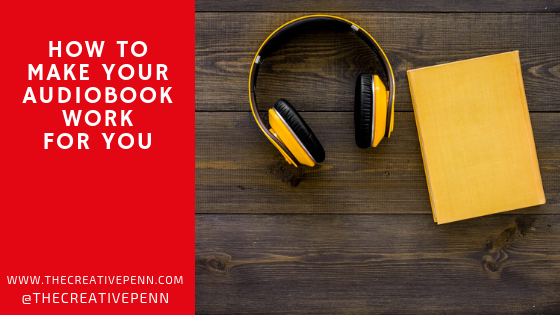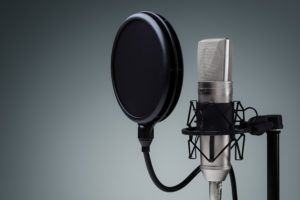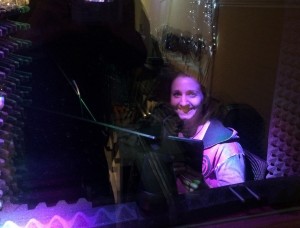Did you know that audiobooks are the fastest growing sector of the entire publishing industry for 5 years in a row? In today’s article, Tina Dietz shares some useful tips for making the most of audiobooks.
 Statistics from Forbes show that digital audiobook revenue is up 32.1% in Q1 of 2018. The industry is current reported to be worth $3.5 billion.
Statistics from Forbes show that digital audiobook revenue is up 32.1% in Q1 of 2018. The industry is current reported to be worth $3.5 billion.
One factor that contributes to this exponential increase in audiobook readership is accessibility.
Where it was once incredibly difficult to listen to books, (anyone remember having to keep track of 12 tapes or half a dozen cds while driving?) audiobooks are now available through our phones, laptops, and tablets, so people can listen to them anywhere they want, whenever they want.
As a result, more and more authors are recognizing the potential that audiobooks offer and the benefits that having an audiobook version can provide. Not only is there potential to make more money, there’s also potential to reach a much larger audience.
You’ve probably heard of other authors creating and publishing audiobooks, but you might not have any idea where to start or how they went about it!
As an audiobook publishing specialist, I see critical mistakes and bottom-line opportunities overlooked time and time again.
If you are an author keen on taking advantage of this booming advancement in publishing (and you have every reason to be), pay attention to these five factors that will bring your audiobook skill level from beginner to boss.
1. Don’t Voice Your Own Book (Unless…)
We very commonly get asked by the author whether they should narrate their own books or work with a professional narrator. It is usually one of the first things asked when someone comes in inquiring about publishing an audiobook.
While this question makes sense, it’s not the right question to be asking yourself. Instead, ask yourself, “Is there any advantage to narrating the book myself?” Usually, the answer is no.
[Note from Joanna: If you are interested in narrating your own book, you’ll find an article about how to do that here.]
One of the reasons for this is that Audiobook Creation Exchange (ACX) reports that it takes an average of 6.2 hours of production time for a professional narrator and editor to create one hour of finished audio.
What this means is that an average non-fiction book of 60,000 words requires twenty-five to thirty hours of production time, and this is for an experienced professional.
Many authors think that if they’re an experienced public speaker or podcaster it will be easier or faster, but the skill set for an audiobook narration is unique.
In addition to specialized voice training and learning the microphone and breathing techniques that are right for audiobook recordings, the time and expense for home recording equipment or studio rental time adds up to quite a bit. All in all, you can reasonably expect to triple your time investment or more.
Instead, your audiobook could be professionally produced at a reasonable cost and delivered to the world with ease in about 6 weeks. It will sound great, and you could be reaping the benefits and leveraging this asset like a boss, rather than spending your time and money going through an unnecessary learning curve.
You might be wondering if there are ever exceptions to this rule. There are…sometimes.
If you have a large following in the millions of people who are used to you speaking on stages, TED talks, or in other audio recordings, and you have built your platform and reputation around your unique voice and speaking qualities, then you might be a good candidate to voice your own audiobooks.
Otherwise, ditch the temptation to try to save money—because you won’t.
2. Know Your Rights
It might seem like a simple thing to just follow the instructions the audiobook creation sites provide, but it’s easy as an amateur to fall prey to the mistake of not knowing your audio rights. It is imperative that you understand the legalities of audiobook production so that you can protect your intellectual and financial investments.
This information is especially important for you to know if you plan to work with a publisher. Knowing your rights can help you negotiate your contract, which many authors accidentally sign away without even knowing it.
It’s too late if you find out after an audiobook version of your print book has been created, and some find themselves not receiving reasonable royalties for the sales of that audiobook. With the rise in the popularity of audiobooks, lack of attention to the detail of your audio rights can add up to substantial financial loss and a big waste of money.
3. Collect Bounties
 Audible, Amazon, and iTunes have a common back end where self-published authors can produce their own audiobooks. If you hold the rights to your audiobook and distribute your audiobook through this exchange (ACX.com), you are eligible to earn bounties for even higher profits.
Audible, Amazon, and iTunes have a common back end where self-published authors can produce their own audiobooks. If you hold the rights to your audiobook and distribute your audiobook through this exchange (ACX.com), you are eligible to earn bounties for even higher profits.
A bounty is on top of the money you make for any royalties you make for selling your audiobook, and it is paid to you when your book is the first purchase of a new Audible member. For each bounty earned, you receive $75.
Unfortunately, ACX is only available if you live in the U.S., U.K., Ireland or Canada, but a good audiobook publisher can help you take advantage of this opportunity as well as self-publishing royalty rates, adding significant income to your bottom line. International authors from other countries can still self-publish on Audible via outlets such as AuthorsRepublic.com and FindawayVoices.com.
4. Leverage Your Launch
Yes, there are right ways to launch an audiobook. It’s not just a matter of getting it published and assuming the sales will come in.
Authors usually come to me for audiobook production in one of two circumstances. In one scenario, you are utilizing an audiobook in order to breathe new life into a previously launched print or digital book.
Following this strategy allows you to have an entirely new book launch without having to create any new content. This is a great strategy to follow, too, if your content needs a little updating. It gives you the ability to pair an “anniversary edition” or “second edition” of your book with an audiobook version to further promote both.
The second scenario is if an author is in the process of getting ready to publish a new book. In this case, having an audiobook version will extend the life of your launch.
To have a powerful launch, you’ll want to reach as many people for as long as possible. Releasing your audiobook two to twelve weeks following your initial book release allows you to keep the momentum and excitement going with minimal changes to your social media and email promotional content.
5. Build a Podcast Tour
The publishing world today is high-tech and fast-paced, which means that doing book tours in person aren’t cost- or time-effective, so you have to find other ways to connect with your target market.
 Blog book tours have been an alternative practice for several years now, but a lesser-known opportunity that exists is podcast tours.
Blog book tours have been an alternative practice for several years now, but a lesser-known opportunity that exists is podcast tours.
Podcasts, or on-demand talk radio that you listen to via app or the computer, are a thriving platform for effectively broadcasting your brand. There are now nearly 60 million people in the U.S. alone listening to podcasts every month, which presents a giant opportunity for you to engage with potential readers. If they listen to podcasts, they likely also listen to audiobooks.
Find hosts of podcast shows that might intersect with your target market, and arrange to be a guest expert on their shows. Conduct a book reading, answer insider questions about the subject matter, and share how listeners can access further information about your title and services. [Note from Joanna: for tips on how to be a great podcast guest read this article.]
To really be a boss, send a short clip of your audiobook to the podcast host in advance of your interview, and invite them to post the clip along with their Amazon affiliate link to your book and audiobook. The host can also include this link in his or her website copy (or “show notes,” as they are known in podcasting) for your podcast episode.
This strategy creates more rich content for the host and an opportunity for both you and the host to benefit financially.
Work with the podcast host to have the show published during your initial launch window, and boom, you’ve successfully leveraged your audiobook to drive sales and initial rankings far beyond the level of a mere beginner.
Are you planning to expand into audiobooks in 2019? Please leave your thoughts below and join the conversation.
 Tina Dietz is an award-winning and internationally acclaimed speaker, audiobook publisher and podcasting expert who has been featured on media outlets including ABC, Inc.com, Huffington Post, and Forbes.
Tina Dietz is an award-winning and internationally acclaimed speaker, audiobook publisher and podcasting expert who has been featured on media outlets including ABC, Inc.com, Huffington Post, and Forbes.
Tina’s podcast, The StartSomething Show, was named by INC magazine as one of the top 35 podcasts for entrepreneurs. Tina’s company, StartSomething Creative Business Solutions, connects leaders, entrepreneurs and experts with larger audiences, resulting in expanded influence and income. Tina divides her time between the US and Costa Rica, where she’s part of a leadership team building a conscious community called Vista Mundo.
For more assistance and information about publishing an audiobook to get your message heard by even more people, download our Audiobook Production Guide and Best Practices.

